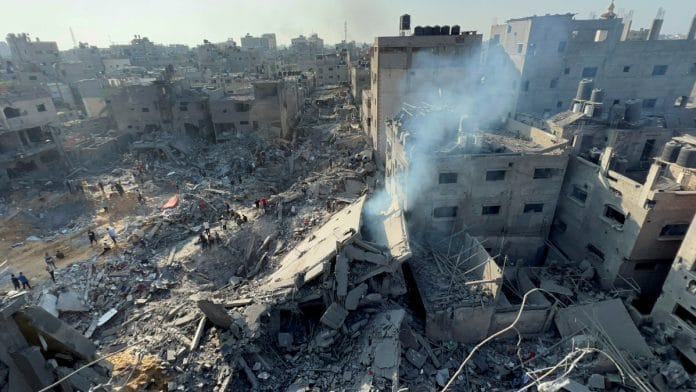Thank you dear subscribers, we are overwhelmed with your response.
Your Turn is a unique section from ThePrint featuring points of view from its subscribers. If you are a subscriber, have a point of view, please send it to us. If not, do subscribe here: https://englishdev.theprint.in/subscribe/
Setting aside who-began-it questions or the larger Jew and Muslim community fighting it out globally, can the two bitter rivals and unfortunate neighbours come to a consensus on some basic minimum points? Surely on both sides civilians are committed to a life purpose that goes beyond fighting each other. Surely, they, like us have purposes big and small that dictate life?
Wars, suppression, exile, illegal occupation, treaties and missile strikes have not resolved one of the oldest conflicts of the world. Violence cannot bring peace. Violence does not have to be war, it can be the systemic suppression that Gazans have faced for generations; it can be the anti-Semitic sentiment that persists globally, even after centuries. ‘Civilised’ modern democracies with all its armoury of peace accords and pacts have failed as have the ‘barbaric’ religious tribes of the bye-gone era.
There is a popular story in Indian mythology of Raktbija. Raktbija got a boon from Shiva that every drop of blood shed upon being killed would manifest several Raktbijas. Thus Durga had a tough time fending him off and had to call upon a more virulent version of herself, Kali, to finish the task. Kali did get the better of Raktbija, but drunk on the wine of blood, Kali loses self-control and goes around killing relentlessly. She is stopped by Shiva who lays prostrate in front of her. Kali is ashamed of stepping on him in her fit of murderous rage. Even in that fit though, Kali held on to some basic morals and ethics in war or uncontrollable rage.
In the context of the ongoing conflict, the role of international bodies like the UN becomes crucial. The Gaza conflict festers at the UN highlights the tensions surrounding the international response to the violence and the differing perspectives of Israel and Palestine.
Slaying Hamas will lead to only more Raktbijas in future, and more mindless killing of innocent people (which we are witnessing in Gaza at the moment). But even Shiva would be powerless without Kali reining herself in; adhering to some moral principles of war. Shiva can only hope he will not be a victim of her rage. In the end, it is only Israel and Palestine who can bring an end to this mindless violence. No Shiva in the form of UN can help if some basic moral and ethical principles are not followed.
Recently Israel declared that after the war, they will take over all of Gaza’s security responsibility for an indefinite length of time. This will lead to spiralling violence in future with periodic quiet. Palestinians have right to live free from Israel’s domination in their own land, just like Israel has the right to self-defence in the current terror attack from Hamas.
For any progress both parties have to give up the self-other binary. As immediate neighbours with shared history, culture and religious sites there is a need for dialogue built on mutual recognition of the Right to Live. The self righteousness of each side and the tendency to denigrate, dehumanize the Other has to end. Governments/authority on either side must stop using the Other as vote-bank material. This extreme polarization is a creation of the 21st century. Muslims and Jews have lived in relative harmony in Palestine for years. Wars have been fought over the land multiple times, but it is the democratic governments that have left no room for dialogue or peace. This successful division of people is a culmination of a nationalism that is built on the decimation of the ‘enemy’. If history has proved time and again it is this, Israel and Palestine/ Jews and Muslims of the Middle East, have their fates hopelessly intertwined.
Palestine and Israel communities could build on the principle of Tat Tvam Asi, that thou art. This principles goes beyond the self other binary, your self is also the so-called Other. Going beyond binaries, Palestinian and Israeli communities must come together to decide what type of an agreement they can come to. Governments must be withheld/held accountable for arousing passions of hate and revenge. Individuals must be convinced that the future is a shared one. Albeit there will be some on both sides who will harbour revenge but they have been given multiple chances to bring peace in the region.
For decades the world has followed the politics of avoidance by looking away at the atrocities going on in the Gaza strip. Anti-Semitic outbursts must be addressed, not doing so will endanger global stability. Non-violence must be given a chance for establishing peace. This peace must be based on mutual acceptance of the other as an equal partner in the region. A politics of moral engagement (Sandel 2010), where disagreement must be non-violent but debate must continue with mutual respect for each other and the recognition that a consensus on a life on common good for the civilians of Israel and Palestine, must be arrived upon. Over all adhering to a belief that, life has a larger purpose than being at perpetual war.
These pieces are being published as they have been received – they have not been edited/fact-checked by ThePrint.


